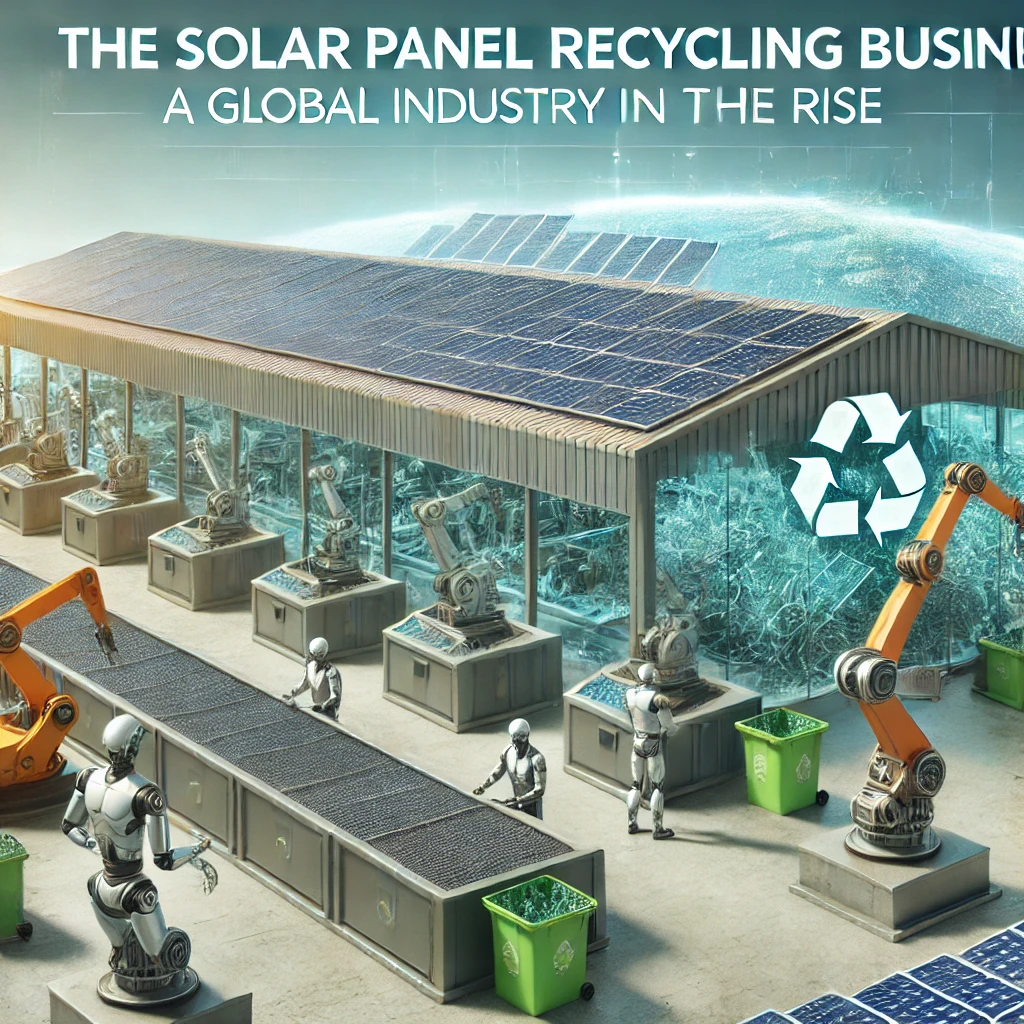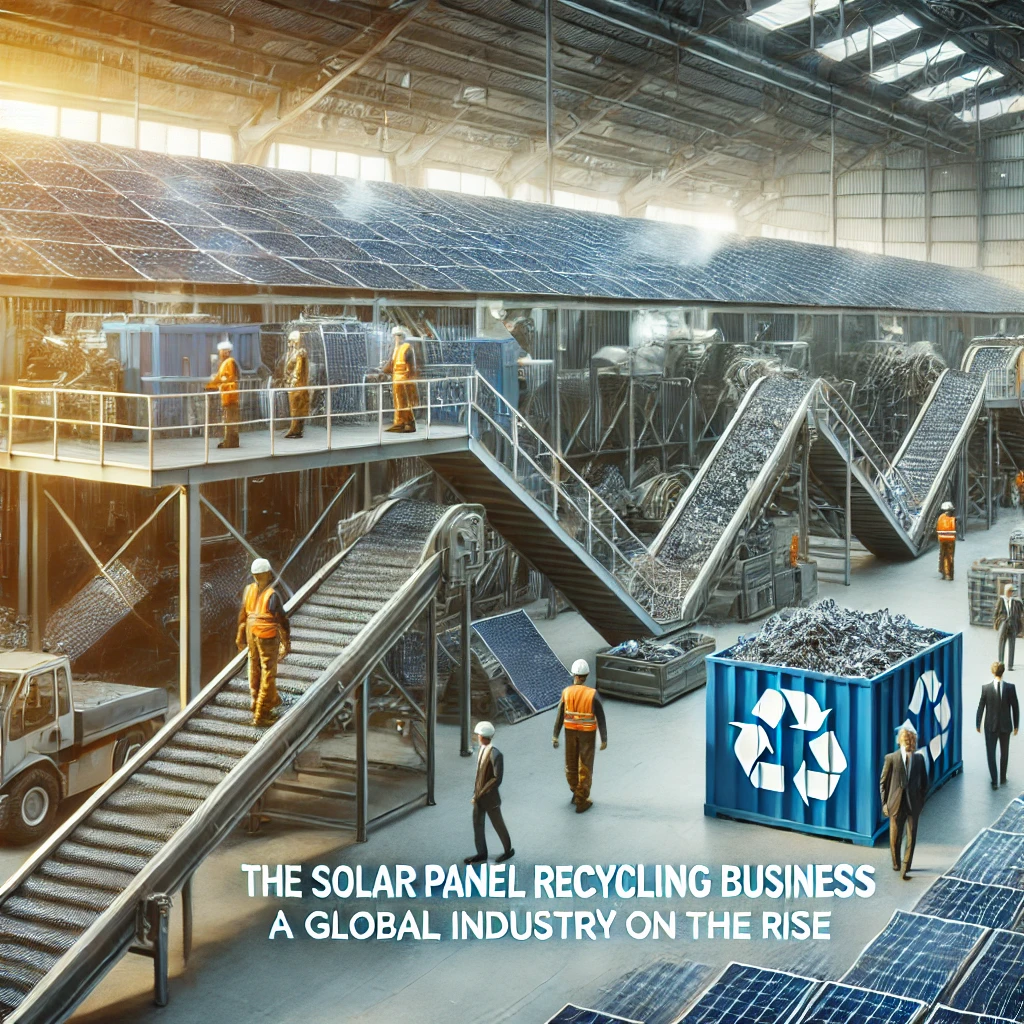The solar industry has experienced exponential growth over the past few decades, driven by the global push for renewable energy solutions. However, with this growth comes the challenge of managing solar panel waste as older installations reach the end of their lifespan. The solar panel recycling business is emerging as a crucial industry, offering sustainable solutions to handle this waste while recovering valuable materials. This article delves into the global landscape of the solar panel recycling business, its processes, challenges, and prospects.
The Growing Need for Solar Panel Recycling
The Rise of Solar Installations
With solar energy becoming increasingly popular, millions of panels are being installed worldwide every year. These panels typically have a lifespan of 25-30 years. As early installations begin to reach their end-of-life stage, the volume of decommissioned panels is set to surge.
Environmental Impact
Improper disposal of solar panels can lead to environmental hazards due to the presence of toxic materials like cadmium and lead. Recycling not only mitigates these risks but also conserves valuable resources such as silicon, silver, and aluminum.
Economic Opportunities
The recycling of solar panels presents a lucrative business opportunity. By recovering and reusing materials, companies can reduce production costs and create new revenue streams, contributing to a circular economy.

The Solar Panel Recycling Process
- Collection and Transportation
The process begins with the collection of decommissioned, damaged, or defective solar panels from residential, commercial, and industrial installations. These panels are then transported to specialized recycling facilities.
- Initial Sorting and Disassembly
At the recycling facility, panels are sorted based on their type and condition. They are then disassembled to separate the glass, metal frames, and other components from the photovoltaic cells.
- Thermal and Mechanical Processing
The photovoltaic cells undergo thermal treatment to remove the encapsulating materials. Mechanical processes, such as shredding and crushing, are used to break down the remaining components and separate the materials.
- Chemical Processing
Chemical treatments are applied to extract valuable materials like silicon, silver, and copper. These processes ensure that the recovered materials meet the quality standards required for reuse in new panels or other applications.
- Material Recovery and Reuse
The recovered materials are purified and repurposed for manufacturing new solar panels or other products in industries such as electronics and construction.
How Do I Start A Solar Panel Recycling Company With No Money?
Starting a solar panel recycling company without initial capital can be challenging, but it is possible with the right strategies:
Leverage Partnerships: Collaborate with existing recycling facilities, solar installation companies, and local governments to gain access to resources and infrastructure.
Apply for Grants and Subsidies: Look for government grants, environmental subsidies, and green business incentives that support recycling and renewable energy initiatives.
Crowdfunding and Investors: Utilize crowdfunding platforms or seek investors interested in sustainable and green businesses.
Start Small: Begin by offering collection and transportation services for decommissioned panels, then expand into full recycling operations as you generate revenue.
Utilize Free Resources: Take advantage of free online courses, business tools, and community programs to build your knowledge and network.
How Long Does It Take To Start A Solar Panel Recycling Company?
The time required to start a solar panel recycling company can vary based on several factors:
Business Planning and Research: 3-6 months to develop a comprehensive business plan and conduct market research.
Securing Funding: 3-12 months depending on the funding sources and investment opportunities.
Obtaining Licenses and Permits: 2-6 months to navigate regulatory requirements and obtain necessary approvals.
Setting Up Operations: 6-12 months to establish facilities, acquire equipment, and hire staff.
Overall, it may take between 1 to 2 years to fully launch a solar panel recycling company.
How Do I Create A Successful Business Plan For A Solar Panel Recycling Company?
A well-structured business plan is essential for the success of a solar panel recycling company. Here are the key components:
Executive Summary: Outline your business goals, mission, and vision.
Market Analysis: Research the demand for solar panel recycling, identify target customers, and analyze competitors.
Business Model: Define your services, pricing strategy, and revenue streams.
Operations Plan: Detail the recycling process, required equipment, and facility setup.
Marketing Strategy: Plan how you will attract customers and promote your services.
Financial Projections: Include startup costs, projected income, expenses, and break-even analysis.
Sustainability Goals: Highlight your commitment to environmental sustainability and how your business contributes to a circular economy.
Key Players in the Global Solar Panel Recycling Business
Europe
Europe is a leader in solar panel recycling, driven by stringent environmental regulations and a strong commitment to sustainability.
PV Cycle: A non-profit organization based in Belgium, PV Cycle provides collection and recycling services for photovoltaic panels across Europe.
Veolia: A French multinational company, Veolia operates one of the largest solar panel recycling plants in France, using advanced technology to recover valuable materials.
North America
The United States and Canada are witnessing growing investments in solar panel recycling, supported by increasing awareness and regulatory initiatives.
First Solar: An American company, First Solar has established a comprehensive recycling program that recovers up to 90% of materials from its cadmium telluride panels.
Reclaim PV Recycling: Based in Australia, Reclaim PV Recycling is expanding its operations to North America, focusing on sustainable solar panel recycling solutions.
Asia-Pacific
Asia-Pacific, particularly China, Japan, and Australia, is becoming a significant player in the solar panel recycling industry due to the high volume of solar installations and increasing environmental concerns.
Suzhou Talesun Solar Technologies: A Chinese company actively involved in the recycling and repurposing of photovoltaic materials.
NPC Incorporated: A Japanese company specializing in solar panel recycling technology and services.
Challenges Facing the Solar Panel Recycling Business
Technical Challenges
Complex Panel Design: The diverse materials and complex structure of solar panels make disassembly and material separation challenging.
Quality Control: Ensuring that recycled materials meet the stringent quality standards required for new solar panels can be difficult.
Economic Challenges
High Recycling Costs: The costs associated with collecting, transporting, and processing solar panels can be high, affecting profitability.
Fluctuating Material Prices: The market prices for recovered materials like silicon and silver can fluctuate, impacting the economic viability of recycling operations.
Regulatory Challenges
Inconsistent Regulations: The lack of standardized recycling regulations across countries can hinder the development of a cohesive global recycling industry.
Limited Government Support: In some regions, inadequate policy support and incentives slow the adoption of recycling practices.
Innovations and Future Prospects
Technological Advancements
Innovations in recycling technology, such as improved thermal and chemical processing methods, are enhancing the efficiency and cost-effectiveness of solar panel recycling.
Circular Economy Integration
Integrating solar panel recycling into a broader circular economy framework can optimize resource use and minimize waste across industries, promoting sustainability.
Policy and Regulatory Support
Governments worldwide are beginning to recognize the importance of solar panel recycling and are introducing policies and incentives to support the industry. Stricter regulations on solar waste disposal and financial incentives for recycling can drive industry growth.
Global Collaboration
International collaboration among governments, industries, and research institutions is crucial for developing global standards and best practices for solar panel recycling. Sharing knowledge and resources can accelerate technological advancements and industry growth.
Conclusion
The solar panel recycling business is poised for significant growth as the world grapples with the environmental and economic challenges of solar waste management. By addressing technical, economic, and regulatory hurdles, the industry can unlock its full potential, contributing to a sustainable future. Whether starting from scratch or expanding an existing operation, solar panel recycling presents vast opportunities for entrepreneurs and environmental advocates alike. As solar energy continues to power our world, recycling will play a pivotal role in ensuring that this renewable resource remains truly sustainable.
Related FAQs
What is solar panel recycling?
Solar panel recycling involves recovering valuable materials from decommissioned solar panels for reuse in new panels or other industries.
Why is solar panel recycling important?
Recycling reduces environmental waste, conserves natural resources, and lowers the carbon footprint associated with new material production.
How are solar panels recycled?
The process includes collection, disassembly, thermal and chemical processing, and material recovery for reuse in manufacturing.
How do I start a solar panel recycling company with no money?
Leverage partnerships, apply for grants, utilize crowdfunding, start small with collection services, and use free resources to build your business.
How long does it take to start a solar panel recycling company?
It typically takes 1-2 years, depending on business planning, securing funding, obtaining permits, and setting up operations.
How do I create a successful business plan for a solar panel recycling company?
Include an executive summary, market analysis, business model, operations plan, marketing strategy, financial projections, and sustainability goals.
Who are the key players in the solar panel recycling industry?
Key players include PV Cycle, Veolia, First Solar, Reclaim PV Recycling, Suzhou Talesun Solar Technologies, and NPC Incorporated.


